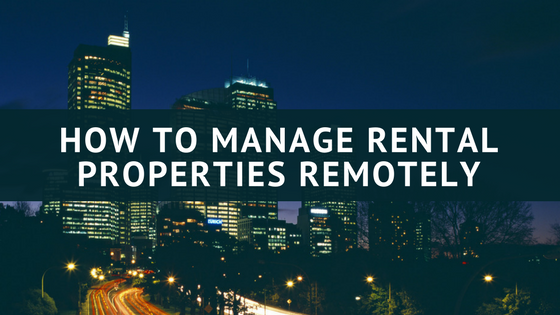If you have chosen the path to self managing your rental property, it is likely you have considered the pros and cons to going at it alone as opposed to hiring a property manager. Often times, this keeps investors local as the decision to self manage typically keeps their investments in areas where they are comfortable, and can get to their properties quickly should something arise.
However, it does not have to be that way. If you are a seasoned real estate investor, you know that there are opportunities in other markets that could fit your investment model, but a decision needs to be made about whether or not to self manage from a long distance.
The good news is that there are tools to help those who choose to manage from afar.
How to Manage Rental Properties Remotely
Here are a few helpful tips to consider prior to getting started.
- Get to Know the Unknown.
- The initial disadvantage is being unfamiliar with a new market. Is the property in a family neighborhood? If so, what are the schools like? What is the crime like in the area and do you need to take additional measures to protect the property during a vacancy? What are the taxes and HOA fees, and how do they impact the return on your investment. What are the trends as it relates to overall home values? What do market rents look like as compared to what you are paying for the property? This is a big one as markets can vary drastically. Does weather impact when you can rent the property? If you are investing in Minnesota, it may be tougher to find a tenant in December as opposed to July. Get to know the market by doing your research as there is more to get acquainted with when investing outside of your “home” market.
- In Case of Emergency
- Who do you call? It is likely that you have some “go to” companies in your local market should an emergency come up, or if there are standard maintenance needs required at the property. In a new market, do you know who to contact? Can you trust that their fees are reasonable and that their work is reputable? It is a good idea to have this figured out BEFORE something happens on the premises. There are online resources out there to help in this process, but you may also want to get to know some of the neighbors to see if they have any recommendations. There are also neighborhood specific sites like ‘NextDoor’ that offer localized commentary on everything from local crime blotters to the best dog walkers in the area. What is important is that while you may be physically removed from a particular locale, there are ways get familiar with the area, which is especially important when determining who you can call (and trust) should something come up. A good tool to use that has pre-qualified contractors and handymen is HomeAdvisor.
- Technology is your Friend
- So you have done your research on the property and the neighborhood to ensure the investment pencils out. Hopefully you have also made a few connections to determine who to contact should an issue arise. The next step is making sure you have the technology in place to manage from afar. Putting the tools in place so the tenants can pay their rent online is an excellent start. After all, if you are doing this long distance, the option to drop it off at your house is not an option and utilizing traditional mail could severely delay when you actually receive the rent check. It may also be wise to consider a smart home security system so that the property is protected during a vacancy. This can schedule lights to be turned on/off so that the home is not dark during a vacancy, or alert you when someone has entered the property during a time when you did not have someone scheduled.
While self managing from long distance is certainly possible, you will still want to schedule time to visit the property in person. These costs should be considered when weighing income, expenses and even your taxes, but at the end of the day, it is still important for you to physically check the status of the property. Otherwise, there are simple steps that can be taken that will allow you to invest in property outside of your local comfort zone, and self managing remains an option.




















